Women's Tax Resistance League
In 1906 Dora Montefiore refused to pay her taxes until women were granted the vote. Outside her home she placed a banner that read: “Women should vote for the laws they obey and the taxes they pay.” As she explained: "I was doing this because the mass of non-qualified women could not demonstrate in the same way, and I was to that extent their spokeswoman. It was the crude fact of women’s political disability that had to be forced on an ignorant and indifferent public, and it was not for any particular Bill or Measure or restriction that I was putting myself to this loss and inconvenience by refusing year after year to pay income tax, until forced to do so by the powers behind the Law."
This resulted in her Hammersmith home being besieged by bailiffs for six weeks. "Towards the end of June, the time was approaching when, according to information brought in from outside the Crown had the power to break open my front door and seize my goods for distraint. I consulted with friends and we agreed that as this was a case of passive resistance, nothing could be done when that crisis came but allow the goods to be distrained without using violence on our part. When, therefore, at the end of those weeks the bailiff carried out his duties, he again moved what he considered sufficient goods to cover the debt and the sale was once again carried out at auction rooms in Hammersmith. A large number of sympathisers were present, but the force of twenty-two police which the Government considered necessary to protect the auctioneer during the proceedings was never required, because again we agreed that it was useless to resist force majeure when it came to technical violence on the part of, the authorities." (1)
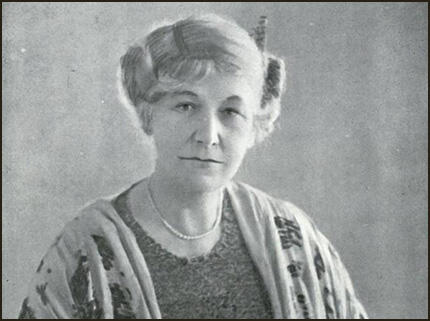
Montefiore's campaign was supported by Annie Kenney and Teresa Billington-Greig but did not find favour with the leadership of the Women Social & Political Union (WSPU) and "no effort was ever made to organise the refusal by women to accept laws made for women without their consent. This changed on 22nd October 1909 when the Women's Freedom League (WFL) established the Women's Tax Resistance League (WTRL). (2)
The first member to take part in the campaign was Dr. Octavia Lewin. It was reported in The Daily Chronicle that the "First Passive' Resister", was was to be taken to court. It was announced in the same report that "the Women's Freedom League intends to organise a big passive resistance movement as a weapon in the fight for the franchise." (3)
The motto adopted by the Women's Tax Resistance League was "No Vote No Tax". According to Elizabeth Crawford, the author of The Women's Suffrage Movement: A Reference Guide 1866-1928 (2000): "When bailiffs seized goods belonging to women in lieu of tax, the TRL made the ensuing sale the occasion for a public or open-air meeting in order to spread the principles of women's suffrage and to rouse public opinion to the injustice of non-representation meted out on tax-paying women." (4)
Over the next few years over 220 women took part in this campaign. This included Janie Allan, Charlotte Despard, Beatrice Harraden, Teresa Billington-Greig, Mary Sargant Florence, Edith How-Martyn, Cicely Hamilton, Dora Marsden, Helena Normanton, Anne Cobden Sanderson, Emma Sproson, Louisa Garrett Anderson, Sime Seruya, Margaret Nevinson, Dorinda Neligan, Henria Williams, Violet Tillard, Edith Zangwill, Maud Arncliffe Sennett, Lena Ashwell, Minnie Turner, Margory Lees, Dora Montefiore, Bertha Brewster, Evelyn Sharp, Eveline Haverfield, Sophia Duleep Singh and Clemence Housman.
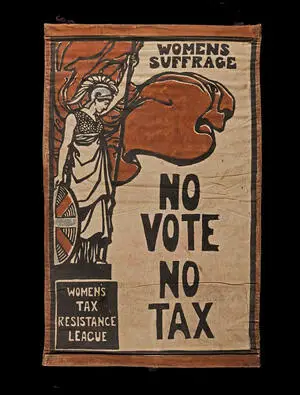
Sylvia Pankhurst, the author of The History of the Women's Suffrage Movement (1931): has argued: "Tax resistance and resistance to enumeration under the Census of that year were mild forms of militancy now in vogue. The Women's Freedom League had hoisted the standard of 'no vote, no tax' in the early days of its formation, and Mrs. Despard and others had suffered a succession of distraints, to the accompaniment of auction sale protest meetings. In November, 1910, the WSPU first adopted the same policy, and the Women's Tax Resistance was formed about this time. In May, 1911, two women were imprisoned for refusal to take out dog licences. A little later, Clemence Housman, sister of the author-artist, Laurence Housman, was committed to Holloway till she should pay the trifling sum of 4s. 6d., but was released in a week's time, having paid nothing." (5)
It was the Women's Tax Resistance League policy of "no taxation without representation" meant that women often went to prison for keeping a dog without a licence. Grace Chappelow, who lived in Hatfield Peverel, refused to buy a dog licence. A commitment order for fourteen days' was issued by the Witham Bench in default of paying 14s. costs. Outside her house was exhibited a large poster. "I am going to prison." (6) It was reported: "Yesterday morning P.s. Brand and P.c. Attridge drove over to Miss Chappelow's house in the police cart. The commitment warrant was produced, and the young lady, without offering the slightest resistance, was arrested. She was placed in the cart between the two police officers and was driven to Witham Police Station, where the necessary formalities were gone through, and then P.s. Brand with a female attendant, escorted Miss Grace Chappelow to Ipswich Prison." (7)
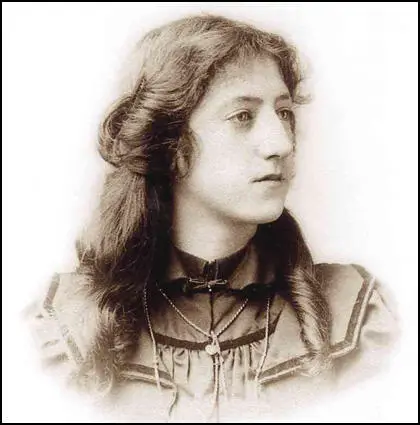
In 1911 Emma Sproson served two terms of imprisonment in Stafford gaol for the offence of not buying a dog licence. Frank Sproson wrote in The Vote: "The humiliating position of the married woman, especially the working woman, is admitted by all Suffragists; but I never realised that she was such an abject slave so clearly as when I stood in the Wolverhampton Police Court, side by side with my wife, charged with aiding and abetting her to keep a dog without a license. The only evidence submitted by the prosecution (the police) that I actually did anything was that I presided at two meetings in support of the "No Vote, No Tax" policy of the Women's Freedom League. That I said anything that was not fair comment on the general policy of militancy there was no evidence to show; if, then, on this point I was liable, then all supporters of militancy are equally so. But I do not believe it was on this evidence that I was convicted. No. The dog was at my house, and cared for by my children during my wife's absence. In the eyes of the law, I was lord and master, so that my offence, therefore, was not that I did anything, but rather that I did not do anything." (8)
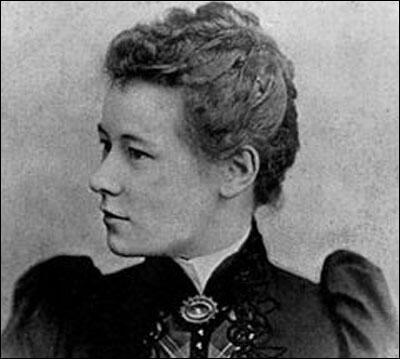
Sophia Duleep Singh was one of the first women to sign up as someone willing to be a tax resister. She knew that this was a dangerous move. The courts warned the women that if they refused to pay, they risked the enforced seizure and sale of their property and the worst offenders would be sent to prison. (9)
In May 1911, at Spelthorne petty sessions, Sophia Duleep Singh's refusal to pay licences for her five dogs, carriage, and manservant led to a fine of £3. In July 1911, against arrears of 6s. in rates, she had a seven stone diamond ring impounded and auctioned at Ashford for £10. The ring was bought by a member of the Women's Tax Resistance League and returned to her. (10)
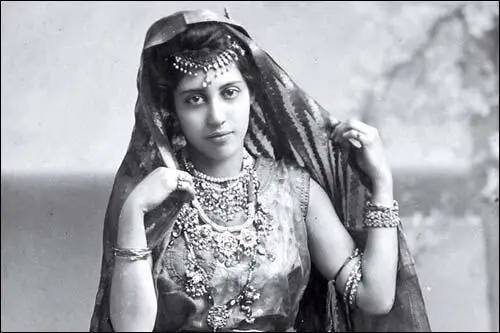
In December 1913 she was summoned again to Feltham police court for not paying her taxes. "The Princess Sophia Duleep Singh, residing at Hampton Road, Hampton Court, attended at Feltham Police Court yesterday upon summonses for refusing to pay taxes... She employed a groom without a licence, and also kept two dogs and a carriage without payment of the necessary licence. She came to court wearing the badge and medal of the Tax Resistance League and was accompanied by six other ladies including the secretary of the league, Mrs Kineton Parkes." (11)
In court she made a statement explaining her reasons for not paying her taxes: "I am unable conscientiously to pay money to the state, as I am not allowed to exercise any control over its expenditure, neither am I allowed any voice in the choosing of members of Parliament, whose salaries I have to help to pay. This is very unjustified. When the women of England are enfranchised and the State acknowledges me as a citizen, I shall, of course, pay my share willingly towards its upkeep, if I am not a fit person for the purposes of representation, why should I be a fit person for taxation?" (12)
Sophia Duleep Singh's refusal to pay a fine of £12 10s. resulted in a pearl necklace, comprising 131 pearls, and a gold bangle studded with pearls and diamonds, being seized under distraint and auctioned at Twickenham town hall, both items being bought by members of Women's Tax Resistance League, the necklace fetching £10 and the bangle £7. "Such actions were a means of achieving publicity. Members of the WTRL, by buying articles under distraint, and organizing protest demonstrations and meetings after the auction, generated interest and sympathy in the movement." (13)
Clemence Housman was on the committee of the Women's Tax Resistance League. She stated that she refused "to pay her taxes until such time as women are enfranchised". In 1909 Clemence Housman took a house, for which she was taxed inhabited house duty to the amount of 4s. 6d. "This, since she was denied all Parliamentary representation, she refused to pay." It was not until July, 1911, that she received a letter from the Board of Inland Revenue, "stating that legal proceedings had been taken for the recovery of the inhabited house duty, amounted to 4s. 6d. and that unless the tax, plus the costs and out-of-pocket expenses, amounting to £4 18s. 6d., were paid steps would be taken for her arrest and imprisonment." (14)
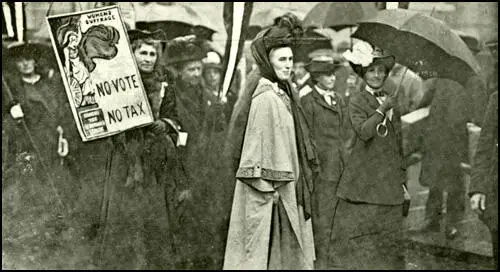
Clemence Housman refused to pay the fine and on Friday 30th September, she was arrested and conveyed to Holloway Prison. On 7th October a meeting was held to protest about her imprisonment. Christabel Pankhurst, Charlotte Despard and Laurence Housman all made speeches. Pankhurst quoted Clemence as saying. "Holloway is women's polling booth; it is there that I have been able to register my vote against a Government that taxes me without representation." Despard talked about her "courageous act of self-sacrifice, and said that tax resistance was drawing women together in a bond as strong as death." (15)
At the end of the meeting the Women's Tax Resistance League issued a statement. "That this meeting, held at the gates of Holloway Gaol, congratulates Miss Clemence Housman on her refusal to pay Crown taxes without representation, a reassertion of that principle upon which Englishman now enjoy, and also upon the successful outcome of her protest. It condemns the Government's actions in ordering her arrest and imprisonment as a violation of the spirit of the Constitution and of representative government; and it calls upon the Government to give votes to women before again demanding from Miss Housman or any other woman taxpayer the payments of taxes." (16) As Elizabeth Crawford has pointed out: "She (Housman) was released after a week, no reason being given, and did not pay her debt until she received the right to vote." (17)
Beatrice Harraden appeared in court in April, 1913, for not paying her taxes: "The least any woman can do is to refuse to pay taxes, especially the tax on actually earned income. This is certainly the most logical phase of the fight for suffrage. It is a culmination of the Government's injustice and stupidity to ask that we pay an income tax on income earned by brains, when they are refusing to consider us eligible to vote. The league was formed three years ago with the slogan: 'No vote, no tax'. It is non-partisan an association of constitutional and militant suffragists, recruited from various suffrage societies for the purpose of resisting taxes." (18)
Members of the Women's Freedom League refused to pay several different taxes including national insurance, Imperial taxes dog licences, duties on carriages and carts and inhabited house duty. In other branches, members tended to make their resisting colleagues' cases the focus of particular campaigns, as in Brighton where the entire branch rallied to support the actions of their secretary and treasurer who had their goods seized and in lieu of their uncollected inhabited house duty in Edinburgh the members resisted paying taxes on the branch's bank interest, and amiably dismissed the Sheriff Officer when "he called to expostulate with us." (19)
One of the most successful cases of tax resistance was carried out by Kate Harvey, a close friend of Charlotte Despard, at her home in Bromley, Kent. In May 1913 she managed to barricade herself into her home against officials attempting to collect the heavy fines imposed on her for her refusal to pay taxes. Accounts of the subsequent sale of her property reported large numbers of sympathizers crowding into the auction and bidding one penny for all the items put up for sale. In the Woman's Freedom League's Annual Report for 1913 it was recorded as "one of the most effective protests we have ever made!", and noted with satisfaction that the Government had made a loss of 7/- on the proceedings." (20)
Dorinda Neligan, the retired head of he Croydon High School for Girls (1874-1902) had been a member of the Women's Tax Resistance League for many years and refused to pay her taxes right up to her death at the age of 81. The Vote reported; "the fact became so well known that one of the local papers, in giving an account of her last sale, headed it "Miss Neligan's Hardy Annual", and another "No Surrender". It was always the same silver teapot that was sold." (21)
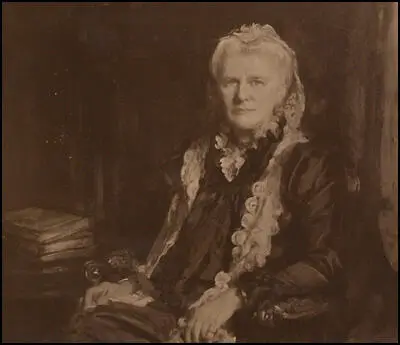
Evelyn Sharp was one of the last to suffer at the hands of the authorities: "So I came home one day, early in 1917, to find a bailiff sitting in my flat. The bailiff was a real gentleman. He obviously hated his job, and since he must have retired long ago I shall do him no harm here by saying that he let me discover this by asking me not to let them know in Carey Street that he was at all friendly with me. It was not easy for either of us to remain enemies, boxed up as we were in the same room all day - I had let my largest room to a war worker - and very soon he was telling me about his son in the Army and I was converting him to votes for women." (22)
Bertha Brewster, a member of the Women Social & Political Union, refused to pay the Inhabited House Duty. (23) Sara Paulley has pointed out: "Her refusal to pay the Inhabited House Duty saw the authorities seize a carriage clock to be sold at auction to raise the taxes she owed. At each sale, a crowd of women would attend to protest. On this occasion, in an attempt to outwit the women, the only auction lot was Bertha's carriage clock. A crowd of women gathered both inside and outside the auction room. The auctioneer mounted the podium and opened the bidding and then without a single bid being made turned to a man in the corner of the room handed him the clock and received in return twenty-one shillings. Uproar ensued. The auctioneer found himself surrounded by angry woman. The police had to come to the aid of the auctioneer who then retrieved the clock from the man and started the auction again. As the women had initially intended it was resold to one of their own. The auctioneer departed, and the women used the auction room to make speeches and accepted an apology from the man who had originally bought it." (24)
Primary Sources
(1) Dora Montefiore, From a Victorian to a Modern (1927)
Between the time of my return to England in 1901, and 1904, when I began my first public protest against the payment of income tax, while I still had no political representation, my mind was slowly maturing and my heart opening out on the subject of many social questions, besides that of the political vote. But my two children were at school and I lived mostly in the country or stayed with my mother at Hove, so there was little chance of working in London. But I was able, soon after the new Local Government Act, allowing women to sit on Parish and Urban District Councils, came into force to do some organising in Sussex for the Local Government Society in Tothill Street, and this work, undertaken voluntarily, gave me a great insight into the working of the Act. I visited during that time every class of person who was likely to be interested in the working of the Act, from cottagers to Bishops, and learnt how everyone was looking forward to better water supplies and better lighting for the villages, not to speak of parish halls, libraries and baths, of which the Act was full of suggestions; but, alas, when talking things over with those experienced in Local Government, I soon became convinced that it was merely the skeleton of an Act, whose dry bones must be clothed with money, if its provisions were effectually to be carried out. However, I obtained in the end promises from two or three women to stand for the Councils, though at the same time I had more than one angry interview with Chairmen of Councils who threatened to resign if women were ever elected; for they asserted it would be quite impossible to discuss questions of drainage with women present. After this experience I felt how deficient my knowledge of drainage, ventilation and kindred subjects was and I took a course of studies at the Health Society in Berners Street. I would recommend the course to any young woman who has a home of her own to look after, even if she does not contemplate sitting on a Council. I have never regretted having acquired the special knowledge that the course offers, either when there has been illness in the home, or when taking a new house, when I have surprised the landlord by pointed enquiries into drainage, cisterns for drinking water, flues of chimneys, etc....
I had already, during the Boer War, refused willingly to pay income tax, because payment of such tax went towards financing a war in the making of which I had had no voice. In 1904 and 1905 a bailiff had been put in my house, a levy of my goods had been made, and they had been sold at public auction in Hammersmith. The result as far as publicity was concerned was half a dozen lines in the corner of some daily newspapers, stating the fact that Mrs. Montefiore’s goods had been distrained and sold for payment of income tax; and there the matter ended. When talking this over in 1906 with Theresa Billington and Annie Kenney, I told them that now we had the organisation of the W.S.P.U. to back me up I would, if it were thought advisable, not only refuse to pay income tax, but would shut and bar my doors and keep out the bailiff, so as to give the demonstration more publicity and thus help to educate public opinion about the fight for the political emancipation of women which was going on. They agreed that if I would do my share of passive resistance they would hold daily demonstrations outside the house as long as the bailiff was excluded and do all in their power outside to make the sacrifice I was making of value to the cause. In May of 1906, therefore, when the authorities sent for the third time to distrain on my goods in order to take what was required for income tax, I, aided by my maid, who was a keen suffragist, closed and barred my doors and gates on the bailiff who had appeared outside the gate of my house in Upper Mall, Hammersmith, and what was known as the “siege” of my house began. As is well known, bailiffs are only allowed to enter through the ordinary doors. They may not climb in at a window and at certain hours they may not even attempt an entrance. These hours are from sunset to sunrise, and from sunset on Saturday evening till sunrise on Monday morning. During these hours the besieged resister to income tax can rest in peace. From the day of this simple act of closing my door against the bailiff, an extraordinary change came over the publicity department of daily and weekly journalism towards this demonstration of passive resistance on my part. The tradespeople of the neighbourhood were absolutely loyal to us besieged women, delivering their milk and bread, etc., over the rather high garden wall which divided the small front gardens of Upper Mall from the terraced roadway fronting the river. The weekly wash arrived in the same way and the postman day by day delivered very encouraging budgets of correspondence, so that practically we suffered very little inconvenience, and as we had a small garden at the back we were able to obtain fresh air. On the morning following the inauguration of the siege, Annie Kenney and Theresa Billington, with other members of the W.S.P.U., came round to see how we were getting on and to encourage our resistance. They were still chatting from the pavement outside, while I stood on the steps of No. 32 Upper Mall, when there crept round from all sides men with notebooks and men with cameras, and the publicity stunt began. These men had been watching furtively the coming and going of postmen and tradesmen. Now they posted themselves in front, questioning the suffragists outside and asking for news of us inside. They had come to make a “story” and they did not intend to leave until they had got their “story.” One of them returned soon with a loaf of bread and asked Annie Kenney to hand it up over the wall to my housekeeper, whilst the army of men with cameras “snapped” the incident. Some of them wanted to climb over the wall so as to be able to boast in their descriptions that they had been inside what they pleased to call “The Fort”; but the policeman outside (there was a police man on duty outside during all the six weeks of a siege) warned them that they must not do this so we were relieved in this respect, from the too close attention of eager pressmen. But all through the morning notebooks and cameras came and went, and at one time my housekeeper and I counted no less than twenty-two pressmen outside the house. A woman sympathiser in the neighbourhood brought during the course of the morning, a pot of home-made marmalade, as the story had got abroad that we had no provisions and had difficulty in obtaining food. This was never the case as I am a good housekeeper and have always kept a store cupboard, but we accepted with thanks the pot of marmalade because the intentions of the giver were so excellent; but this incident was also watched and reported by the Press. Annie Kenney and Theresa Billington had really come round to make arrangements for a demonstration on the part of militant women that afternoon and evening in front of the house, so at an opportune moment, when the Press were lunching, the front gate was unbarred and they slipped in. The feeling in the neighbourhood towards my act of passive resistance was so excellent and the publicity being give by the Press in the evening papers was so valuable that we decided to make the Hammersmith “Fort” for the time being the centre of the W.S.P.U. activities, and daily demonstrations were arranged for and eventually carried out. The road in front of the house was not a thoroughfare, as a few doors further down past the late Mr. William Morris’s home of “Kelmscott,” at the house of Mr. and Mrs. Cobden-Sanderson, there occurred one of those quaint alley-ways guarded by iron posts, which one finds constantly on the borders of the Thames and in old seaside villages. The roadway was, therefore, ideal for the holding of a meeting, as no blocking of traffic could take place, and day in, day out the principles for which suffragists were standing we expounded to many who before had never even heard of the words Woman Suffrage. At the evening demonstrations rows of lamps were hung along the top of the wall and against the house, the members of the W.S.P.U. speaking from the steps of the house, while I spoke from one of the upstairs windows. On the little terrace of the front garden hung during the whole time of the siege a red banner with the letters painted in white: “Women should vote for the laws they obey and the taxes they pay.”
(2) Sylvia Pankhurst, The History of the Women's Suffrage Movement (1931)
Tax resistance and resistance to enumeration under the Census of that year were mild forms of militancy now in vogue. The Women's Freedom League had hoisted the standard of "no vote, no tax" in the early days of its formation, and Mrs. Despard and others had suffered a succession of distraints, to the accompaniment of auction sale protest meetings. In November, 1910, the WSPU first adopted the same policy, and the Women's Tax Resistance was formed about this time. In May, 1911, two women were imprisoned for refusal to take out dog licences. A little later, Clemence Housman, sister of the author-artist, Laurence Housman, was committed to Holloway till she should pay the trifling sum of 4s. 6d., but was released in a week's time, having paid nothing.
(3) Frank Sproson, The Vote (8th July, 1911)
The position in Wolverhampton in regard to tax resistance is certainly of interest to the supporters of militancy.
We do meet occasionally in the Suffrage movement, the woman with the pitiful tale: I should like to help you, but I dare not; my husband is against me. But it is, indeed, a revelation to meet an enthusiastic supporter with an equally sympathetic husband, who finds herself hampered, through the decisions of magistrates who hold the husband liable for the deeds of his wife.
Ever since I began to take a serious interest in politics I have believed in sex equality, and have never denied my wife the freedom that I myself claim, and, as I shall endeavour to show, it [is] because of this that I was convicted.
The humiliating position of the married woman, especially the working woman, is admitted by all Suffragists; but I never realised that she was such an abject slave so clearly as when I stood in the Wolverhampton Police Court, side by side with my wife, charged with aiding and abetting her to keep a dog without a license. The only evidence submitted by the prosecution (the police) that I actually did anything was that I presided at two meetings in support of the "No Vote, No Tax" policy of the Women's Freedom League. That I said anything that was not fair comment on the general policy of militancy there was no evidence to show; if, then, on this point I was liable, then all supporters of militancy are equally so. But I do not believe it was on this evidence that I was convicted. No. The dog was at my house, and cared for by my children during my wife's absence. In the eyes of the law, I was lord and master, so that my offence, therefore, was not that I did anything, but rather that I did not do anything.
I did not assert my authority, I did not force my wife into subjection, and however legal the magistrate's decision may have been, it certainly was not just.
It was the spirit of rebellion against injustice displayed by Mrs. Emma Sproson that first won for her my admiration. This admiration is far too deep rooted to be suppressed by the decision of magistrates.
I admire the rebel against injustice, man or woman, because I know that it is to them that all real progress is due. A friend once said to me, when criticising my wife, "But what would happen if all other women did as she is doing?" I replied: "They would get the vote to-morrow"; and he saw it. The pity is that others do not.
(4) Votes for Women (6th October 1911)
Two years ago (1909) Miss Clemence Housman took a house, for which she was taxed inhabited house duty to the amount of 4s. 6d. This, since she was denied all Parliamentary representation, she refused to pay.
In July of this year Miss Housman received a letter from the Board of Inland Revenue, stating that legal proceedings had been taken for the recovery of the inhabited house duty, amounted to 4s. 6d. and that unless the tax, plus the costs and out-of-pocket expenses, amounting to £4 18s. 6d., were paid steps would be taken for her arrest and imprisonment.
Mr. Laurence Housman said that women had awakened to a great sense of political responsibility, and in their fight for enfranchisement they were bound to win. It was impossible to go on denying the vote to the majority of the people of any country when once they possessed that spirit of self-government.
In our last issue we published copies of the correspondence between Miss Clemence Housman and the Inland Revenue Department relating to her refusal to pay her taxes until such time as women are enfranchised, and we stated that her arrest was imminent. On Friday morning (30th September) the blow fell; she was arrested and conveyed to Holloway Prison, where she is still in detention. As a debtor, she is entitled to first-class treatment, including the right to retain her own clothing; on the other hand, the law sets no term to the period of her incarceration.
The principle for which Miss Housman is contending is not now. It is the same old principle for which John Hampden risked his liberty in the seventeenth century, and for which other notable champions of representative government have suffered at different periods of history. But with each new section of the population who was awakened to a sense of their exclusion from citizenship, and who, in consequence, refuse any longer o pay taxes levied without their consent, the problem takes on new forms. The old arguments of opposition are furbished up again: the "divine rights of kings" becomes the "divine rights of men". Damn nature is invoked once more to support the ancient order which is passing away. But all to no purpose. One gentle woman such as is Clemence Housman can dispel by a brave act all their sophistries, and demonstrate over again the truth of the saying that government without the consent of the governed is impossible.
(5) Statement made by the Women's Tax Resistance League (7th October 1911)
That this meeting, held at the gates of Holloway Gaol, congratulates Miss Clemence Housman on her refusal to pay Crown taxes without representation, a reassertion of that principle upon which Englishman now enjoy, and also upon the successful outcome of her protest. It condemns the Government's actions in ordering her arrest and imprisonment as a violation of the spirit of the Constitution and of representative government; and it calls upon the Government to give votes to women before again demanding from Miss Housman or any other woman taxpayer the payments of taxes.
(6) The Vote (14th October 1911)
Miss Christabel Pankhurst was in her place on the cart, surrounded by the speakers. One's eyes were rivetted by the sight of the tall, self-possessed lady, quiet and undemonstrative, who scarcely twenty-four hours before had been inside those prison walls. The singing and the enthusiasm were to reach her in her cell, but the action of the authorities in releasing Miss Housman enabled her to be seen instead of the unseen centre of the demonstration. Her words, too, carried great weight. Humorously she contrasted the treatment of men voters and voteless women: agents to do everything for the men, motors to take them to the polling booth….
Turning to the prison, Miss Housman exclaiming dramatically. "Holloway is women's polling booth; it is there that I have been able to register my vote against a Government that taxes me without representation." Only words of courtesy were heard concerning all the officials with whom Miss Housman had come into contact, and she was cheered to the echo when she declared that, glad as she was to be outside Holloway, she was ready to go back again to win the fight for the recognition of women's citizenship.
"If that great act of justice, the Conciliation Bill, fails to carry next year, there will be not merely one but hundreds of women in prison to make the nation realise that justice is not being done." Thus spoke Mr. Laurence Housman, whose pride in his sister's devotion to the woman's cause was shared by those who listened. Women were only doing what men had gloried in doing in times past, he added, they were struggling for constitutional liberties; women, too, had caught the spirit of democracy. Mrs. Despard, heedless of the drenching rain, made an appeal which touched the hearts of all who heard it; she rejoiced to the victory won by Miss Housman's courageous act of self-sacrifice, and said that tax resistance was drawing women together in a bond as strong as death.
(7) Chelmsford Chronicle (15th November 1912)
Up to Thursday Miss Grace Chappelow, of Hatfield Peverel, against whom a commitment order for fourteen days' has been issued by the Witham Bench in default of paying 14s. costs in a dog case heard by the Bench, had not been arrested. Outside her house is exhibited a large bill. "I am going to prison." The police have reasoned with the young lady, and tried to persuade her to pay the amount, and so avoid being taken, but she refuses, and has declared her intention to the police to be taken to prison. Unless the money is paid she will probably be removed to Ipswich prison shortly.
(8) Chelmsford Chronicle (22nd November 1912)
On Monday morning Miss Grace Chappelow, of Nounsley, Hatfield Peverel, was arrested by the Witham Police, and was subsequently removed to Ipswich Prison to undergo fourteen days' incarceration in default of paying 14s, as ordered by the Witham Bench, in a case where her dog was concerned. Miss Chappelow, who is a noted suffragette, had gained additional notoriety by her declaration to a daily newspaper that she would not pay, but would go to prison. Yesterday morning P.s. Brand and P.c. Attridge drove over to Miss Chappelow's house in the police cart. The commitment warrant was produced, and the young lady, without offering the slightest resistance, was arrested. She was placed in the cart between the two police officers and was driven to Witham Police Station, where the necessary formalities were gone through, and then P.s. Brand with a female attendant, escorted Miss Grace Chappelow to Ipswich Prison.
(9) Votes for Women (11th April 1913)
Three members of the Women's Tax Resistance League have their goods sold during the week: Mrs Skipwith of Woking, for refusal to pay Property Tax, on April 3; Miss Bertha Brewster for non-payment of Inhabited House Duty, and Miss Raleigh for refusal to pay Imperial Taxes, on April 5.
(10) Sophia Duleep Singh, speech in court, The Times (30th December, 1913)
I am unable conscientiously to pay money to the state, as I am not allowed to exercise any control over its expenditure, neither am I allowed any voice in the choosing of members of Parliament, whose salaries I have to help to pay. This is very unjustified. When the women of England are enfranchised and the State acknowledges me as a citizen, I shall, of course, pay my share willingly towards its upkeep, if I am not a fit person for the purposes of representation, why should I be a fit person for taxation?
(11) Evelyn Sharp, Unfinished Adventure (1933)
So I came home one day, early in 1917, to find a bailiff sitting in my flat. The bailiff was a real gentleman. He obviously hated his job, and since he must have retired long ago I shall do him no harm here by saying that he let me discover this by asking me not to let " them" know in Carey Street that he was at all friendly with me. It was not easy for either of us to remain enemies, boxed up as we were in the same room all day - I had let my largest room to a war worker - and very soon he was telling me about his son in the Army and I was converting him to votes for women. Under the circumstances it was difficult for him to stay the whole twenty-four hours in my apartment, although, when I pointed this out to one of the officials who came round, he replied stiffly, "Everything is proper under the Act," which gave me an idea for a French farce that I have never carried out. But the bailiff had finer feelings, and he made it as pleasant as he could for me by getting his meals elsewhere and going home at night and for weekends. To enable him to do this I promised him that I would remove nothing from the flat, and he was good enough to say that my simple word was enough for him. When at last the day came, quite six weeks later, on which they were to remove my furniture, he arrived in a state of deep distress at his usual hour after breakfast. I asked him if there was anything to be done about it, and he averted his face, as if ashamed to speak.
(12) Claire Louise Eustace, The Evolution of Women's Political Identities in the Women's Freedom League (1993)
Tax resistance by members outside London continued apace with well-attended public meetings organised at the sale of goods in a number of areas." The most spirited of these protests was undertaken by Kate Harvey, a close friend of Charlotte Despard, at her home in Bromley, Kent. In May 1913 she managed to barricade herself into her home against officials attempting to collect the heavy fines imposed on her for her refusal to pay taxes. Accounts of the subsequent sale of her property reported large numbers of sympathizers crowding into the auction and bidding one penny for all the items put up for sale. In the League's Annual Report for 1913 it was recorded as "one of the most effective protests we have ever made!", and noted with satisfaction that the Government had made a loss of 7/- on the proceedings."

